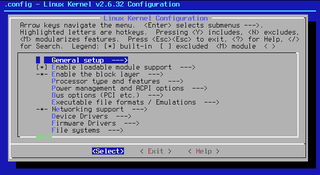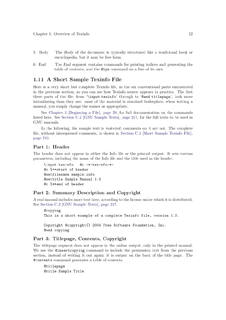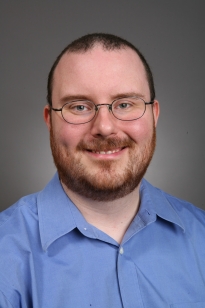
The free software movement is a social movement with the goal of obtaining and guaranteeing certain freedoms for software users, namely the freedoms to run the software, to study the software, to modify the software, and to share copies of the software. Software which meets these requirements is termed free software. The word 'free' is ambiguous in English, although in this context, it means 'free as in freedom', not 'free as in zero price'. A common example is, "to think of free speech, not free beer."

GNU is an extensive collection of free software, which can be used as an operating system or can be used in parts with other operating systems. The use of the completed GNU tools led to the family of operating systems popularly known as Linux. Most of GNU is licensed under the GNU Project's own General Public License (GPL).

ncurses is a programming library providing an application programming interface (API) that allows the programmer to write text-based user interfaces in a terminal-independent manner. It is a toolkit for developing "GUI-like" application software that runs under a terminal emulator. It also optimizes screen changes, in order to reduce the latency experienced when using remote shells.

Vim is a clone, with additions, of Bill Joy's vi text editor program for Unix. Vim's author, Bram Moolenaar, based it on the source code for a port of the Stevie editor to the Amiga and released a version to the public in 1991. Vim is designed for use both from a command-line interface and as a standalone application in a graphical user interface. Vim is free and open-source software and is released under the Vim license that includes some charityware clauses, encouraging users who enjoy the software to consider donating to children in Uganda. The Vim license is compatible with the GNU General Public License through a special clause allowing distribution of modified copies under the GNU GPL-2.0-or-later license.

The GNU Project is a free software, mass collaboration project that Richard Stallman announced on September 27, 1983. Its goal is to give computer users freedom and control in their use of their computers and computing devices by collaboratively developing and publishing software that gives everyone the rights to freely run the software, copy and distribute it, study it, and modify it. GNU software grants these rights in its license.

Theo de Raadt is a South African-born software engineer who lives in Calgary, Alberta, Canada. He is the founder and leader of the OpenBSD and OpenSSH projects and was also a founding member of NetBSD. In 2004, De Raadt won the Free Software Award for his work on OpenBSD and OpenSSH.
Pamela Jones, commonly known as PJ, is the creator and was editor of Groklaw, a website that covered legal news of interest to the free and open-source software community. Jones is an Open Source advocate who previously trained and worked as a paralegal.

Texinfo is a typesetting syntax used for generating documentation in both on-line and printed form with a single source file. It is implemented by a computer program released as free software of the same name, created and made available by the GNU Project from the Free Software Foundation.

Free as in Freedom: Richard Stallman's Crusade for Free Software (ISBN 0-596-00287-4) is a free book licensed under the GNU Free Documentation License about the life of Richard Stallman, written by Sam Williams and published by O'Reilly Media on March 1, 2002.

Bradley M. Kuhn is a free software activist from the United States.

Free and open-source software (FOSS) is software that can be classified as both free software and open-source software. That is, anyone is freely licensed to use, copy, study, and change the software in any way, and the source code is openly shared so that people are encouraged to voluntarily improve the design of the software. This is in contrast to proprietary software, where the software is under restrictive copyright licensing and the source code is usually hidden from the users.
The GNU Simpler Free Documentation License (GSFDL) is a proposed version of the GNU Free Documentation License (GFDL) that has no requirements to maintain Cover Texts and Invariant Sections. It is meant to provide a simpler licensing option for authors who do not wish to use these features in the GFDL.
The following tables compare general and technical information for a number of available boot loaders.
License compatibility is a legal framework that allows for pieces of software with different software licenses to be distributed together. The need for such a framework arises because the different licenses can contain contradictory requirements, rendering it impossible to legally combine source code from separately-licensed software in order to create and publish a new program. Proprietary licenses are generally program-specific and incompatible; authors must negotiate to combine code. Copyleft licenses are deliberately incompatible with proprietary licenses, in order to prevent copyleft software from being re-licensed under a proprietary license, turning it into proprietary software. Many copyleft licenses explicitly allow relicensing under some other copyleft licenses. Permissive licenses are compatible with everything, including proprietary licenses; there is thus no guarantee that all derived works will remain under a permissive license.

A free-software license is a notice that grants the recipient of a piece of software extensive rights to modify and redistribute that software. These actions are usually prohibited by copyright law, but the rights-holder of a piece of software can remove these restrictions by accompanying the software with a software license which grants the recipient these rights. Software using such a license is free software as conferred by the copyright holder. Free-software licenses are applied to software in source code and also binary object-code form, as the copyright law recognizes both forms.

Copyleft is the practice of granting the right to freely distribute and modify intellectual property with the requirement that the same rights be preserved in derivative works created from that property. Copyleft in the form of licenses can be used to maintain copyright conditions for works ranging from computer software, to documents, art, scientific discoveries and even certain patents.

The GNU General Public License is a series of widely used free software licenses that guarantee end users the freedom to run, study, share, and modify the software. The licenses were originally written by Richard Stallman, founder of the Free Software Foundation (FSF), for the GNU Project, and grant the recipients of a computer program the rights of the Free Software Definition. The GPL series are all copyleft licenses, which means that any derivative work must be distributed under the same or equivalent license terms. This is in distinction to permissive software licenses, of which the BSD licenses and the MIT License are widely used, less restrictive examples. GPL was the first copyleft license for general use.

The GNU Free Documentation License is a copyleft license for free documentation, designed by the Free Software Foundation (FSF) for the GNU Project. It is similar to the GNU General Public License, giving readers the rights to copy, redistribute, and modify a work and requires all copies and derivatives to be available under the same license. Copies may also be sold commercially, but, if produced in larger quantities, the original document or source code must be made available to the work's recipient.
The Free Software Foundation (FSF) is a 501(c)(3) non-profit organization founded by Richard Stallman on October 4, 1985, to support the free software movement, which promotes the universal freedom to study, distribute, create, and modify computer software, with the organization's preference for software being distributed under copyleft terms, such as with its own GNU General Public License. The FSF was incorporated in Boston, Massachusetts, US, where it is also based.

Veusz is a scientific plotting package. Veusz is a Qt application written in Python, PyQt and NumPy. It is freely available for anyone to distribute under the terms of the GPL. It is designed to produce publication-quality plots. The name should be pronounced as "views".















